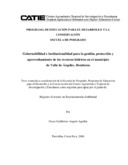| dc.contributor.author | Angulo Aguilar, Oscar G. | |
| dc.date.accessioned | 2014-10-20T05:07:23Z | |
| dc.date.available | 2014-10-20T05:07:23Z | |
| dc.date.issued | 2007 | es_ES |
| dc.identifier | 370054 | es_ES |
| dc.identifier.uri | https://repositorio.catie.ac.cr/handle/11554/5177 | |
| dc.identifier.uri | http://orton.catie.ac.cr/repdoc/A1309e/A1309e.pdf | es_ES |
| dc.description | Tesis (M. Sc) -- CATIE, Turrialba (Costa Rica), 2007 | es_ES |
| dc.description.abstract | En el Municipio de Valle de Angeles, Francisco Morazán, ocurren situaciones de conflicto de uso de la tierra por la presión urbana y el crecimiento de la frontera de agrícola, afectando las zonas donde se ubican las fuentes y presas de agua. El Programa FOCUENCAS II inició un proceso de manejo y gestión de los recursos naturales para solucionar estos problemas, poniendo énfasis en la participación de actores locales. La investigación estuvo orientada a identificar elementos claves que sirvan de insumos para elaborar instrumentos para la gestión del agua. Fue de carácter descriptivo cualitativo, cuya metodología empleada fue la investigación-acción participativa. Estuvo enfocada en el análisis de la legislación, la capacidad de los actores para la gestión del agua, la presencia de conflictos socio-ambientales en torno al recurso y al análisis de los actores y factores a favor o en contra de la protección del agua. Los resultados indican que la legislación actual promueve duplicidad de funciones y traslape de competencias, lo que ocasiona dispersión de esfuerzos. Existen conflictos socio-ambientales de uso de la tierra, pero también suceden procesos de mediación que promueven su solución. In the Municipality of Valle de Angeles, Francisco Morazán, situations of conflict for land use, urban pressure and the growth of the agricultural frontier occur affecting the areas where water sources and small daMON are located. The program FOCUENCAS II began a natural resources management process to solve these probleMON, putting emphasis on the participation of local actors. This investigation was led to identify key elements serving as input to elaborated instruments for water management. The research has a qualitative-descriptive character. The methodologywas the participative-action investigation. It was focused on the analysis of the legislation, the capacity of actors for the management of water, the presence of socio-environmental conflicts around the water source and the analysis of actors and factors in favour or against the protection of water. The results indicated that legislation in Honduras promotes duplicity of duties and responsibility overlapping. These factors cause dispersion of efforts. Socio-environmental conflicts related to land use are present, but mediation processes are promoting their solution. | es_ES |
| dc.language.iso | es | es_ES |
| dc.publisher | CATIE, Turrialba (Costa Rica) | es_ES |
| dc.subject | RECURSOS HIDRICOS | |
| dc.subject | GESTION | |
| dc.subject | ADMINISTRACION | |
| dc.subject | PARTICIPACION | |
| dc.subject | TOMA DE DECISIONES | |
| dc.subject | MEDIO AMBIENTE | |
| dc.subject | CONSERVACION DE AGUAS | |
| dc.subject | CONFLICTOS SOCIALES | |
| dc.subject | UTILIZACION DE LA TIERRA | |
| dc.subject | LEGISLACION MEDIOAMBIENTAL | |
| dc.subject | HONDURAS | |
| dc.title | Governability and institutionality for the management, protection and use of water resources in the municipality of Valle de Angeles, Honduras | es_ES |
| dc.title.alternative | Gobernabilidad e institucionalidad para la gestión, protección y aprovechamiento de los recursos hídricos en el municipio de Valle de Angeles, Honduras | es_ES |
| dc.type | Tesis de maestría | es_ES |
| dcterms.rights | acceso abierto | es_ES |
| dc.identifier.publication | Turrialba (Costa Rica) | es_ES |


